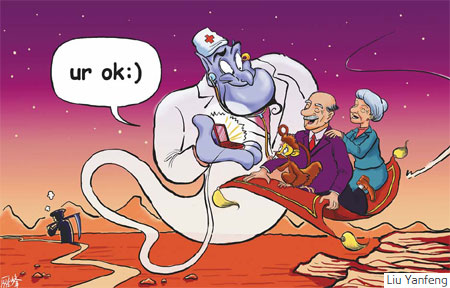 Not content with offering calls, texts and Internet access, the mobile phone industry is convinced it can help save lives and offer health services to millions worldwide.
Not content with offering calls, texts and Internet access, the mobile phone industry is convinced it can help save lives and offer health services to millions worldwide.
The idea of a phone serving as a "doctor in your pocket" has gained traction at the industry's biggest trade show, the Mobile World Congress, in Barcelona.
Among a slew of possible applications in poor countries, insiders stressed the potential for the mobile phone to remind people to get vaccinations, take medicine, or undergo HIV tests.
Doctors and nurses working far from hospitals or clinics can also use mobile connections to relay information on local patients or report disease outbreaks.
"When you consider that there are 2.2 billion mobile phones in the developing world, 305 million computers but only 11 million hospital beds you can instantly see how mobiles can create effective solutions to address healthcare challenges," says Terry Kramer, strategy director at British operator Vodafone.
The Rockefeller Foundation, the UN Foundation and The Vodafone Foundation announced the Mobile Health (mHealth) Alliance last week, a partnership to advance the use of mobile technology in healthcare.
The UN and Vodafone also released a study, mHealth for Development: The Opportunity of Mobile Technology for Healthcare in the Developing World, detailing 51 programs in 26 countries.
The biggest adopters are India with 11 projects and South Africa and Uganda with six each.
"Innovative technology could reduce the pressure on public healthcare systems," Daniel Carucci, vice-president of health at the UN Foundation, says.
In Uganda, for example, a multiple choice quiz about HIV/AIDS was sent to 15,000 subscribers on the Celtel network in a rural region, inviting them to answer questions and seek tests.
Users who completed the quiz were given free airtime and each time they answered a question wrong they received a message informing them of the correct response.
At the end of the quiz, a final SMS was sent to motivate participants to go for voluntary testing and counseling at a local health center.
Slightly less than one in five responded and the number of people who went for testing at the center increased from 1,000 to 1,400 during a six-week period, the report says.
In another example given in the report, health workers in the Amazonas state of Brazil began filling in surveys last October on their mobile phones on incidences of the mosquito-borne dengue fever.
"The devices are providing us with precision (and) the information we need to develop (effective responses) in the areas where the infection levels are high," Luzia de Melo Mustafa, an Amazonas health agent was quoted as saying.
In Mexico, a medical hotline called MedicallHome was launched in 1998 to provide for people without access to a doctor. They can ring or send an SMS to ask for advice.
"Sixty percent of the time, you can replace the doctor," Pedro Yrigoyen, co-founder of MedicallHome says, highlighting the fact that mobile phones outnumber fixed lines in Mexico by five-to-one.
"Public healthcare is overwhelmed. People wait for hours just to see the doctor."
Elizabeth Boehm, an analyst at research group Forrester, sees the potential for mobile phones to help in public health information campaigns, but also points out limitations.
"One of the main challenges, in mobile health, is that people who are most in need of healthcare are usually more aged, so they don't use the mobile or they're not comfortable with it," she says.
In the developed world, researchers are also looking for ways to harness mobile technology.
In several countries, diabetes sufferers can measure their blood sugar level with a device connected to a mobile phone which sends the data to doctors to verify.
Other applications are seen for monitoring people with heart problems or Alzheimer's disease.
In the United States, a service called "Foodphone" enables a user to take a photo of his or her food before a meal and send it to an expert who replies with information about the nutritional value.
(Agencies via China Daily February 25, 2009)